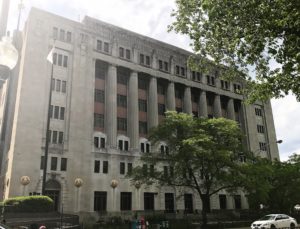Cook County Chief Judge Announces New Order Limiting Use of Monetary Bond
Chicago Appleseed and our partner Chicago Council of Lawyers applaud today’s announcement by Timothy C. Evans, Chief Judge of the Circuit Court of Cook County, that his office will direct judges to set monetary bonds only in amounts that people can pay. This move brings Cook County in line with a recent federal court decision in Harris County (Houston), Texas that found incarcerating people pretrial solely because they cannot afford to pay bond violates the both the Equal Protection and Due Process Clauses of the United States Constitution.

Under General Order Number 18.8A, “Procedures for bail hearings and pretrial release,” judges presiding over bond hearings will be required to conduct inquiries on the record about each defendant’s ability to pay before imposing a secured monetary bond in that amount or less. The new order attempts to limit de facto pretrial detention caused only by someone’s lack of access to money and will require various concrete findings before detention is ordered. People who do not pay their bonds and remain detained in Cook County Jail after seven days will be granted re-hearings. Importantly, this re-hearing provision applies to everyone incarcerated solely due to inability to pay bond and not only people charged with some crimes, as under SB 2034.
Evans’s announcement follows the lead of recent court rule changes in Maryland[1], New Mexico[2], and Arizona[3], each of which requires that judges set monetary bonds based on an accused person’s ability to pay. Likewise, it conforms to Attorney General directives[4] in place as part of the recent overhaul of pretrial justice in New Jersey, which has seen a 36% decrease in jail population this year compared to 2015 numbers. Between January 1 and May 31, 2017, judges in New Jersey imposed monetary bail only nine times. Cook County’s new court rule is also in line with the American Bar Association’s Criminal Justice Section Standards on Pretrial Release, which state, “The judicial officer should not impose a financial condition that results in the pretrial detention of the defendant solely due to an inability to pay.”
Cook County Jail is overwhelming filled with people incarcerated pretrial, and most are there because they cannot post a monetary bond. Cook County incarcerates many more people who are legally innocent than other jurisdictions: CCJ’s more than 90% pretrial population is much higher than the national rate of 63%. Of these people awaiting trial, 62% are there only because they cannot pay their monetary bonds. Cook County Jail is the largest single-site jail in the country and costs the county $330 million every year.
If implemented correctly and fully, General Order 18.8A will have the effect of dramatically reshaping pretrial justice in Cook County. No longer will the majority of people in Cook County Jail be there solely because they cannot post bond, incarcerated pretrial without the due process required for actual detention decisions.
As with most policy changes, however, the test of the new order’s effectiveness will be in its implementation. Robust training for all judges who preside over bond hearings is needed if Cook County is to shift away from the money-based system we have relied on for decades. Enforcement will fall largely on the Office of the Chief Judge, and the rule’s impact must be reviewable by community members and advocates. Previous bond reform attempts have provided little actual relief. Proper evaluation of the order’s impact and judicial compliance requires collection and public disclosure of data on bond court outcomes. We look forward to working with both the Office of the Chief Judge and our community partners in bail reform to track the changes in bond court and resulting decrease in Cook County Jail’s population.
You can read the Office of the Chief Judge’s Legal Commentary supporting the order here.
[1] “A judicial officer may not impose a financial condition in form or amount that the judicial officer knows or has reason to believe the defendant is financially incapable of meeting and that will result in the defendant being detained solely because of that financial incapability.” Rule 4-216.1(d)(1)(B). For the full text of the new rule, which became effective July 1, 2017, download this PDF.
[2] “The court shall not set a secured bond that a defendant cannot afford for the purpose of detaining a defendant who is otherwise eligible for pretrial release.” Rule 5-401(E)(1)(c). For the full text of the new rules, download this PDF.
[3] “The court must not impose a monetary condition that results in unnecessary pretrial incarceration solely because the person is unable to pay the bond.” Rule 7.3(b)(2). For the full text of the rules, download this PDF.
[4] Under the directive, prosecutors cannot seek money bail unless (among other conditions): “the defendant is reasonably believed to have financial assets that will allow him or her to post monetary bail in the amount requested by the prosecutor without having to purchase a bond from a surety company or to obtain a loan[.]” For the full directives, download this PDF.
